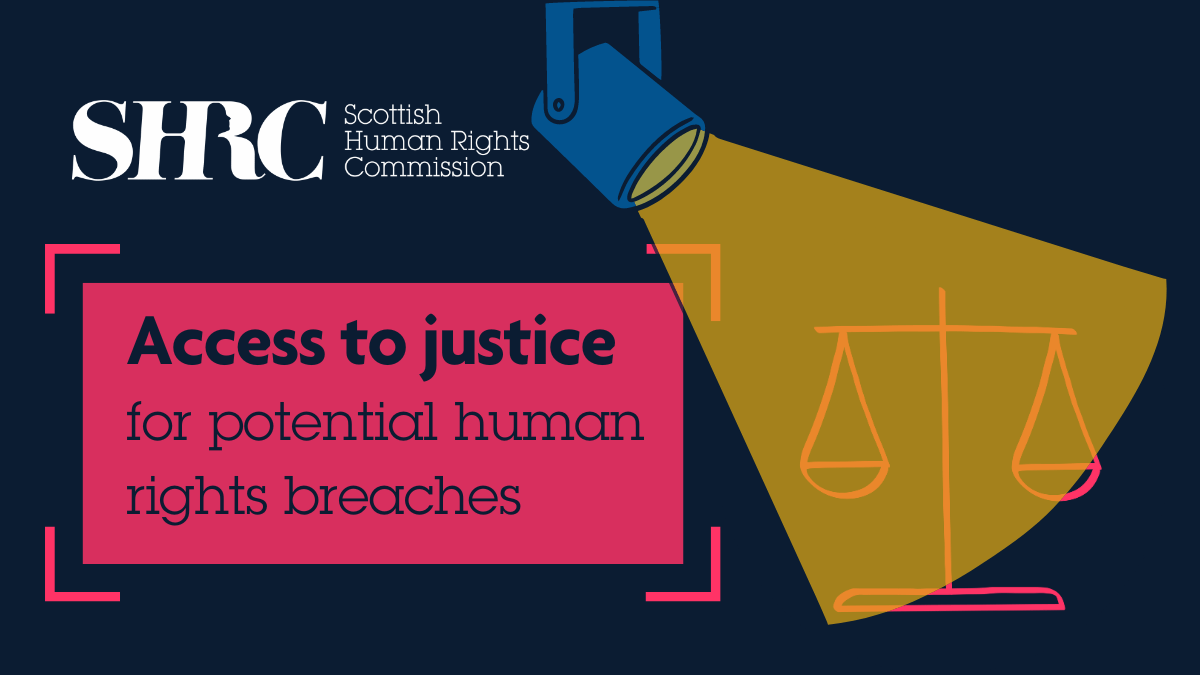Why we are spotlighting this issue
In Scotland, our human rights are protected by international and domestic law. These laws should help to prevent breaches of our rights and provide us with routes to access justice when things go wrong.
Yet too often, people in Scotland are experiencing human rights denials and facing barriers that prevent them from accessing justice.
The journey to access justice for human rights breaches can be long, complicated, and expensive, requiring rights holders to have:
- knowledge about where to turn for help or how to complain
- money for and access to specialist legal advice
- time and emotional resilience to pursue different complaints mechanisms
What the project will do
This project is the latest in a programme of work which touches on issues relating to access to justice.
In this spotlight, we have decided to look directly at barriers to accessing justice for different rights and groups. This project looks at access to justice:
- Access to justice for economic, social, cultural and environmental rights
- Mapping human rights-related advice and advocacy services in Scotland
- Access to justice for prisoners
- Access to justice in community-based social care
Mapping human rights-related advice and advocacy services in Scotland
We know that a major barrier facing people who try to access justice for potential human rights violations is a lack of information about where to get advice.
In response to this, we jointly commissioned research with the Children and Young People’s Commissioner Scotland (CYPCS) to map the landscape in order to gain a better understanding of the availability, distribution, and focus of services offering human rights-related advice and advocacy in Scotland.
We used our research findings to create the two functional maps below which chart advice and advocacy services across a range of human rights-related issues.
The first map covers services relating to:
- Education
- Housing
- Poverty
- Social security
- Benefits
- Health
- Mental health
- Disability
- Social care
- Care system
The second map covers services relating to:
- Civil justice
- Criminal justice
- Immigration / asylum
- Detention
- Equality / Discrimination
- Workers’ rights
- Biometrics, AI & privacy
- Freedom of expression
Find out more
Have five minutes? Read the factsheet, available as a PDF and in Word.
Have longer? Read the research report, available as a PDF. Please let us know if you require this report in an alternative format.

What we will do next

Access to justice for prisoners
This part of the project looks at the journey to justice for prisoners who may have experienced human rights breaches, mapping a route through the prisoner complaints process and the barriers that they face when seeking justice.
Access to justice in community-based social care
This part of the project will focus on barriers to challenging Self Directed Support decisions, specifically when entitlements have been reduced without a reduction in need.
We will produce reports for each element and they will be published in due course.
Additionally, through consultation with rights holders, civil society and key stakeholders during the development of our Strategic Plan 2024-28 , we identified access to justice as an area which requires our continued focus. This theme, as well as our top priorities, will inform future Spotlight Projects over the next four years.

Long Description
Front cover of the Scottish Human Rights Commission's 2024-28 Strategic Plan. Dark background with colourful circles. On some of the circles are symbols including people, scales of justice and a map of Scotland.
Long description ends.
How to find out more
For media enquiries about this project, please contact media@scottishhumanrights.com
For further information, contact us on hello@scottishhumanrights.com
To find out more about our previous work on issues relating to access to justice, see the following projects:













